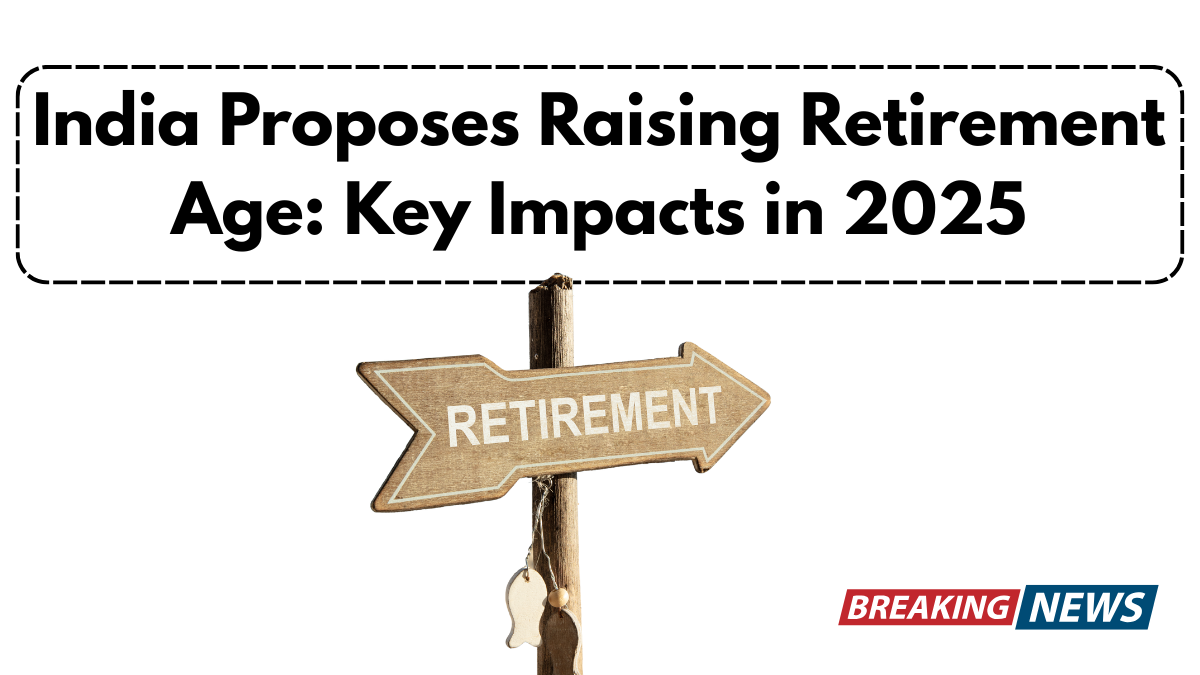The Government of India has initiated a significant shift in workforce policy by proposing an increase in the official retirement age across several sectors. The move, aimed at addressing demographic shifts and leveraging experienced manpower, has triggered a nationwide discussion. Here’s a detailed breakdown of what this means for employees, employers, and the economy.

Why India Is Reconsidering the Retirement Age
The proposal to increase the retirement age in India stems from the dual challenge of an aging yet active population and a growing need to sustain economic productivity. With life expectancy improving and more professionals remaining healthy and competent beyond the age of 60, the current retirement norms seem increasingly outdated. Policymakers argue that extending working years could help reduce pension burden and fill skill gaps in critical sectors like healthcare, education, and administration.
This move also aligns with trends in several developed countries, where the retirement age has gradually climbed to 65 or even 67. India’s demographic dividend, which once emphasized a young workforce, is now transitioning to a phase that demands effective senior participation.
Key Sectors Likely to Be Affected
The proposed india retirement age increase may initially apply to government employees, with phased rollouts expected for public sector undertakings (PSUs) and eventually the private sector. The sectors under immediate focus include:
- Education and Research Institutions
- Healthcare and Medical Services
- Judicial and Administrative Departments
- Defence and Law Enforcement (Selective Roles)
Here’s a comparative table to illustrate the expected changes:
| Sector | Current Retirement Age | Proposed Retirement Age | Implementation Timeline |
|---|---|---|---|
| Central Govt Employees | 60 | 62–65 | Q3 2025 |
| State Govt Employees | 60 | 62 (varies by state) | Late 2025 to 2026 |
| Teachers & Professors | 62 | 65 | Starting July 2025 |
| Healthcare Workers | 60 | 63–65 | Progressive, from Sept 2025 |
Economic and Social Ramifications
The india retirement age increase is expected to bring mixed economic outcomes. On one hand, the move will ease the pressure on pension funds and reduce dependency ratios. On the other, it may delay job opportunities for younger aspirants, particularly in government positions.
Employers may benefit from the retained expertise and reduced training costs. But to make this policy effective, it’s essential to also invest in health programs, flexible work schedules, and upskilling opportunities for older employees. There’s also the social angle: many professionals see work as a source of purpose and stability, and this extension could improve their mental and financial well-being.
How Employees Are Responding
Reactions to the proposal have been mixed. Senior employees, particularly those in advisory or academic roles, have largely welcomed the idea. However, youth organizations and job aspirants have voiced concerns over limited job turnover.
Unions have also called for optional retirement extensions rather than mandatory implementation. In sectors with physically demanding roles, stakeholders are urging for differentiated policies based on job nature and employee health status.
The government has assured that public consultations and phased rollouts will be part of the policy deployment to balance stakeholder interests.
What to Expect in the Coming Months
As of June 2025, the india retirement age increase is still under final review, with pilot implementations being planned in central ministries. A nationwide policy framework is likely to be unveiled by the end of Q3 2025.
Organizations should begin reassessing HR strategies, pension fund allocations, and health benefits to accommodate these shifts. Meanwhile, employees should stay informed through official notifications and consider financial and career planning under the new timelines.
FAQs
What is the proposed retirement age in India as of 2025?
The proposal recommends raising the retirement age from 60 to between 62 and 65, depending on the sector and job role.
Will this affect private sector employees?
Not immediately. The initial rollout targets government and public sector jobs, but private companies may adopt similar policies over time.
Are there exemptions for physically demanding jobs?
Yes, there are considerations to tailor retirement policies based on job type and physical requirements, particularly in the defence and manual labor sectors.
When will the new retirement age be implemented?
Pilot rollouts are expected from Q3 2025, with broader adoption by the end of 2026.
Can employees opt for early retirement under the new policy?
The government is considering optional extensions, meaning employees could still retire earlier if they choose.
For More Information Click Here



